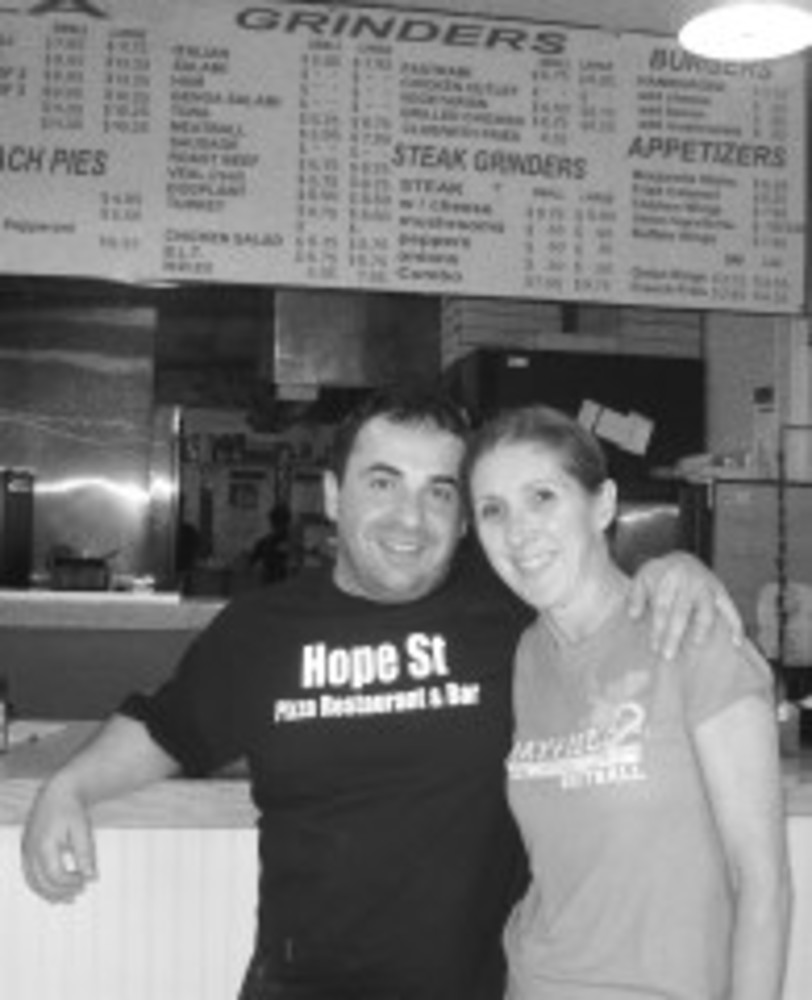Any way you slice it, Hope Street Pizza is a neighborhood favorite
 PROVIDENCE – Athanasios “Saki” Meltsakos is the type of person who, within a half an hour of meeting you, will rename you, using the endearing Greek ending “ki” – this is how I found out that, in Greece, I’d be called Irinaki. He and his wife, Lena Zafiriades, are the busy owners of Hope Street Pizza in Providence. The two met as children and have pictures to prove it. Lena would visit her mother’s village in Greece and play with Saki, who lived there with his parents. One summer, they both came to visit the village as adults and started dating. Saki smiles, “The rest is history.”
PROVIDENCE – Athanasios “Saki” Meltsakos is the type of person who, within a half an hour of meeting you, will rename you, using the endearing Greek ending “ki” – this is how I found out that, in Greece, I’d be called Irinaki. He and his wife, Lena Zafiriades, are the busy owners of Hope Street Pizza in Providence. The two met as children and have pictures to prove it. Lena would visit her mother’s village in Greece and play with Saki, who lived there with his parents. One summer, they both came to visit the village as adults and started dating. Saki smiles, “The rest is history.”
Saki learned his way around the kitchen from his mother, who taught him to bake at six. Forced to move to the mountains to attend school – the village offered only elementary education – Saki lived alone in a rented one-bedroom apartment from the time he was twelve years old. His mother would check on him a few times a week, but she had to stay at home to take care of her blind father. Having to cook for himself forced Saki to become quite proficient. Now, many years later, he uses that skill in his restaurant. He created all the recipes for Hope Street Pizza; now he oversees his chefs’ preparation of the dishes. Though employing 17 people, most of whom have been with the restaurant for many years, Saki still makes some of the menu items, such as the organic bean soup, himself. Lena frequently stops by the restaurant. She explains, “One of us is always here. Our customers are so close to us that they expect to see our faces.”
Lena is first generation American, but speaks Greek fluently. Her parents, who came to the United States more than fifty years ago, have owned Town Pizza in Riverside since the 1970s. When Saki first came to America in the late 1990s, he worked for her parents.
Lena says, “That’s where he learned the ins and outs.” The restaurant was busy; Saki became comfortable with rush times and a sudden influx of people doesn’t bother him at all. Lena seems to have gotten used to the lifestyle as well.
She grew up saying she never wanted to own a restaurant, but now is very much involved in running Hope Street Pizza. When she is not there, she is finishing graduate school, where she is studying clinical social work. “We’ve been in business together since day one,” she asserts. A mother of three, she wouldn’t have it any other way. “We are still equal in this thing together, and I think that’s what worked.”
The two weren’t always this optimistic. Back in 1998, when Saki was juggling his duties as cook at Town Pizza and as a carpenter, building Hope Street Pizza, he was working seven days a week. After the new place opened, the neighborhood folks took a while to realize that that they lived near a great restaurant. Saki sighs, “We lived day by day.” It also took some time for the owners to figure out their customers’ preferences. Saki and Lena kept adjusting the menu to offer healthier fare, which is much in demand. Eventually, the place became well known through word of mouth. Lena points out the advantage they have over a franchise, explaining that they are happy to make a dish to order if someone wishes something unusual.
A loyal customer walked in during this interview, raving about the food and describing it as “fresh, natural and wholesome.” She continued praising the excellent service and said that she likes the family-friendly atmosphere. After she left, Lena said that seeing her customers genuinely happy is the most rewarding aspect of owning a restaurant.
Saki is also proud of having a loyal clientele. He tells a story of the late Saul Spitz, who came in when Hope Street Pizza was first open. Spitz gave Saki some sage advice, telling him to not offer delivery: “If you believe in yourself, people will come to you.” And they do. To this day, Saki is thankful for this wisdom.
Irina Missiuro (IMissiuro@gmail.com) is an editorial consultant to The Jewish Voice.
Editor’s note: This is one of a series of profiles of local businesses, some of which advertise in The Jewish Voice.







